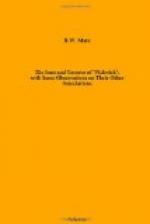Accepting this evidence, we naturally assume the “Rose and Crown” to be the “Town Arms,” which, late in the evening, Mr. Pickwick and his companions, assisted by Sam, dismounting from the roof of the Eatanswill coach, entered through an excited crowd assembled there. They found, however, the inn had no accommodation to offer, but through the friendliness of Mr. Pott, Mr. Pickwick and Winkle accompanied that gentleman to his home, whilst Mr. Tupman, Mr. Snodgrass and Sam repaired to the “Peacock.” They all first dined together at the “Town Arms” and arranged to reassemble there in the morning. It was here the barmaid was reported to have been bribed to “hocus the brandy and water of fourteen unpolled electors as was a stopping in the house,” and where most of the exciting scenes of the election either took place, or had their rise in its precincts.
On the same authority we locate the “Swan” as being the original of the “Peacock,” the headquarters of the “buffs,” where Tupman and Snodgrass lodged, and where was told the Bagman’s story which brings us up against yet another problem—“which was the inn on Marlborough Downs that plays so important a part in that narrative?”
We think, however, Mr. Charles G. Harper has solved the knotty point in his valuable book The Old Inns of Old England. He comes to the conclusion, by a process of elimination, that the “Waggon and Horses” at Beckhampton, which exists to-day, nearly realises the description of the inn given in the story. “It is,” he says, “just the house a needy bagman such as Tom Smart would have selected. It was in coaching days a homely yet comfortable inn, that received those travellers who did not relish either the state or the expense of the great Beckhampton Inn opposite, where post-horses were kept, and where the very elite of the roads resorted.”
[illustration: The “Waggon and Horses,” Beckhampton. Drawn by C. G. Harper]
If its comfort, as described in the following paragraph, is to-day equal to that found by Tom Smart, it is a place to seek for personal pleasure, as well as a Pickwickian landmark.
“In less than five minutes’ time, Tom was ensconced in the room opposite the bar—the very room where he had imagined the fire blazing—before a substantial matter-of-fact roaring fire, composed of something short of a bushel of coals, and wood enough to make half a dozen decent gooseberry bushes, piled half-way up the chimney, and roaring and crackling with a sound that of itself would have warmed the heart of any reasonable man. This was comfortable, but this was not all, for a smartly dressed girl, with a bright eye and a neat ankle, was laying a very clean white cloth on the table; and as Tom sat with his slippered feet on the fender, and his back to the open door, he saw a charming prospect of the bar reflected in the glass over the chimney-piece, with delightful rows of green bottles and gold labels, together with




